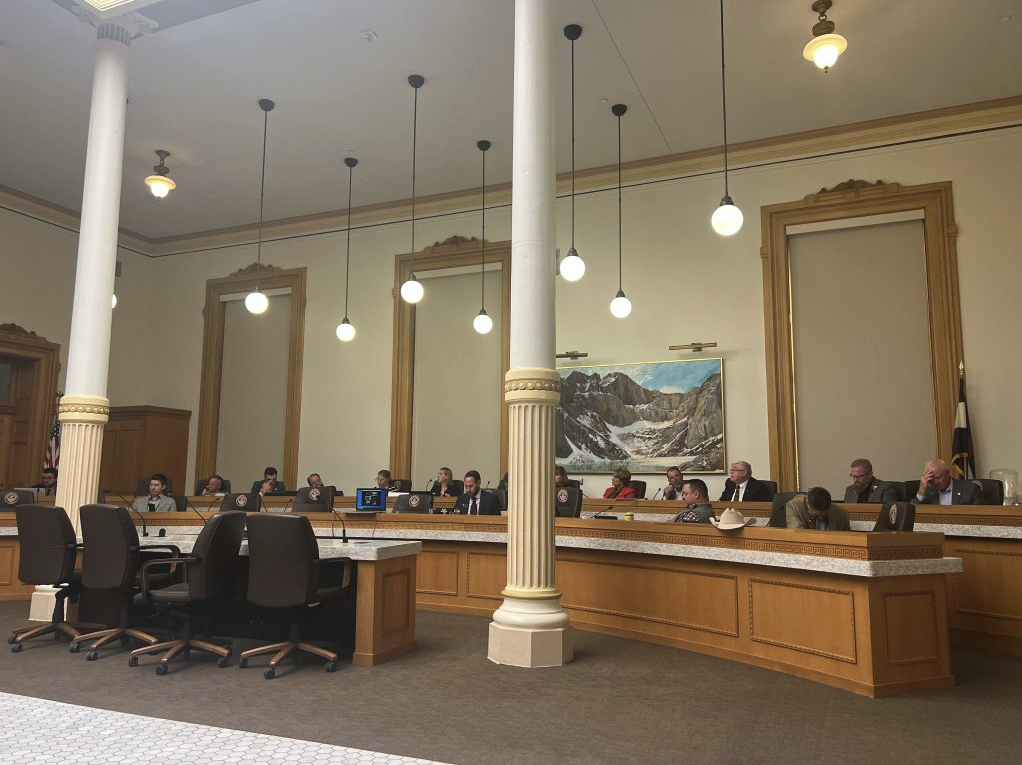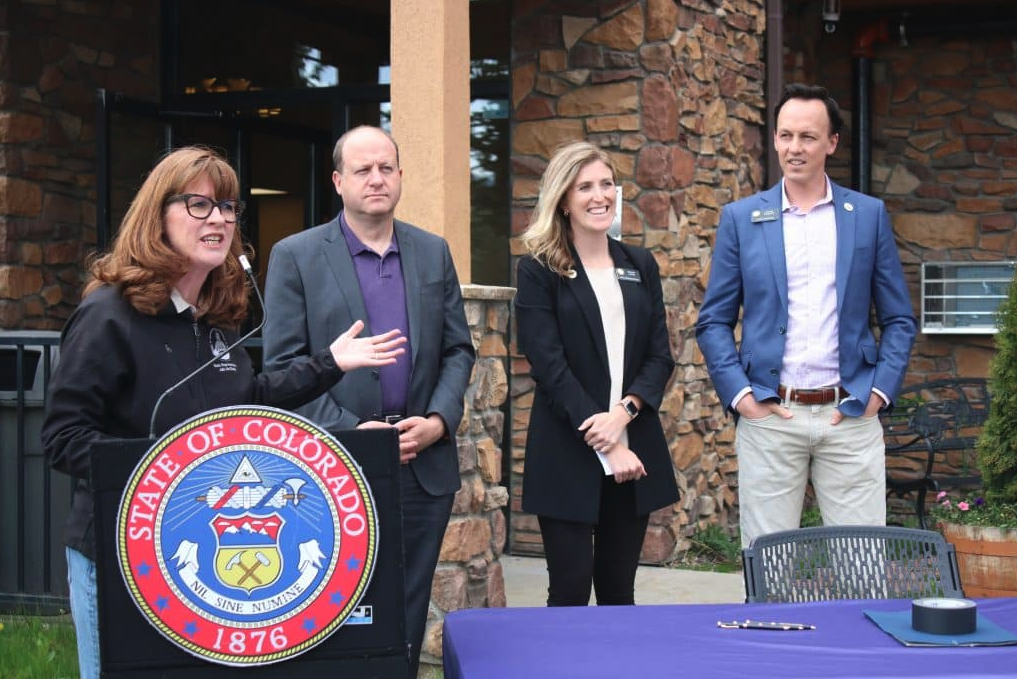 The Legislative Council committee meets at the Colorado State Capitol Nov. 15 to review bills from the legislature’s interim committees. Lawmakers will gather next week in a special session that will reopen long-standing negotiations over how property taxes are handled in the state
The Legislative Council committee meets at the Colorado State Capitol Nov. 15 to review bills from the legislature’s interim committees. Lawmakers will gather next week in a special session that will reopen long-standing negotiations over how property taxes are handled in the state
Elliott Wenzler/Summit Daily News
When Colorado lawmakers come together next week for a special legislative session on property taxes, some legislators and political groups will be focused on one thing: playing defense for school funding.
Lawmakers announced earlier this year that Colorado, which is in the bottom half of states for per-student funding, would finally meet its constitutional requirements for school support for the first time since the Great Recession.
Now, lawmakers will have to make sure that vow is kept.
“We want to ensure that the investments we made this last year are fully realized,” said House Speaker Julie McCluskie, a Dillon Democrat.
The special session, called by Gov. Jared Polis and beginning Aug. 26, will reopen long-standing negotiations over how property taxes are handled in the state. School districts, which are largely funded by local property taxes, generally support the call for a special session but are also watching closely in case it impacts their support from the state. While lawmakers from both sides of the aisle say they want to protect the promised growth in school funding, the ongoing property tax wars present certain risks.
Polis called the special session in the hopes of finding a compromise with the supporters of two ballot measures that would dramatically slash property tax revenue in Colorado. The supporters have said they will withdraw the ballot measures, initiatives 50 and 108, if the legislature agrees to cut property taxes further.
Initiative 50 would impose a 4% annual statewide cap on property tax revenue growth. As a proposed constitutional amendment, it would require 55% of voters’ approval to pass.
Initiative 108 would lower the assessment rate used to calculate residential properties and commercial properties, decreasing property taxes by an estimated $3 billion. At least some of that tax collection, which would otherwise go to local government services including school districts, would be required to be replaced by the state.
If a proposed compromise, which was presented to the state’s Property Tax Commission last week, is approved, the state will likely avoid any impacts to the school funding promises. But if the negotiations change or fall through, the extra dollars could evaporate before they ever make it to schools.
 Colorado House Speaker Julie McCluskie speaks outside a former Days Inn turned workforce housing during Gov. Jared Polis’s bill signing in Summit County on Monday, June 5, 2023.
Colorado House Speaker Julie McCluskie speaks outside a former Days Inn turned workforce housing during Gov. Jared Polis’s bill signing in Summit County on Monday, June 5, 2023.
Ryan Spencer/Summit Daily News
The suggested solution, which builds off a bipartisan property tax bill passed earlier this year, proposes a relatively modest increase in the property tax cuts from the earlier-passed Senate Bill 233 and a slightly stronger limit on tax growth. That new deal, which still must be considered by the 100-person legislature during the special session, would cause more than $100 million in additional cuts for schools funding.
Sen. Rachel Zenzinger, the vice chair of the powerful Joint Budget Committee, said that amount wouldn’t be hard for the state budget to replace using either the general fund or the state education fund, which is funded by a 0.33% state income tax and has nearly $2 billion in it.
Under both Senate Bill 233 and the proposed deal, school districts would have a separate property tax rate from other local districts for the first time.
“The most important thing to me is that we continue to keep school finance decoupled from these decisions,” said Zenzinger, a Democrat who represents Arvada, “because we worked so hard to get us to this place, and I wouldn’t want to go back.”
School funding promises broken
When property tax revenue tanked during the Great Recession, the state established the Budget Stabilization Factor, an accounting tool that allowed the state to underpay its constitutional obligations to schools.
The funding obligation hasn’t been met again since then, costing schools $10 billion. But earlier this year, state budget writers approved a budget that finally met the funding requirement.
While many advocates for schools say the commitment still doesn’t provide the support truly needed, they said it’s a step in the right direction.
But if negotiations fall through and either initiative 50 or 108 were to pass, the state could be at risk of bringing back the Budget Stabilization Factor. The measures could also jeopardize a new school funding formula approved this year that promises to distribute more state dollars to rural schools.
The Colorado Rural Schools Alliance was one of dozens of groups to call for the special session out of fear of the initiatives passing.
“The damage would be colossal,” said Michelle Murphy, the executive director of the organization.
Beyond the initiatives, the Colorado Rural Schools Alliance and the Colorado School Finance Project are still worried about how the state will meet its funding obligations into the future as property tax wars persist.
“The concern is that everybody looks at the state ed fund as the funding source, and how realistic is that long term?” said Tracie Rainey, executive director of the Colorado School Finance Project.
In response to long-term concerns, Zenzinger said initiatives 50 or 108 passing presented a much greater risk then reopening negotiations.
“People forget that we have $2 billion in the state ed fund,” she said. “We are going to be fine.”
Sen. Barbara Kirkmeyer, a Brighton Republican who also serves on the Joint Budget Committee and sponsored Senate Bill 233, said if the proposed negotiation is approved, she believes the state won’t have to return to the Budget Stabilization Factor. Local districts would instead take the brunt of the additional property tax cuts.
But property tax negotiations between the groups have proved tenuous in the past. When the bipartisan Senate Bill 233 was passed earlier this year, it was heralded as a grand compromise between Republicans and Democrats. But the deal broke down as some said it didn’t go far enough, prompting proponents of initiatives 108 and 50 to move forward with their more aggressive approach.
“As long as there are not any other bills that are passed that would increase property tax revenues or rates or anything of that nature,” Kirkmeyer said, “That essentially would make the deal not the deal anymore.”
Some Democrats have floated the idea of inserting language into a special session bill that prevents ballot measures from being used to create leverage in future property tax debates. Another idea is to change the state Constitution to allow local districts to impose property taxes. Kirkmeyer said if those ideas were approved, the deal would be off.
At that point, Democrats would be left to fight Initiatives 50 and 108 at the ballot box. It’s unclear if either measure has enough support to pass.
Source link : http://www.bing.com/news/apiclick.aspx?ref=FexRss&aid=&tid=66c9a1e9cd2a45eeaafd95ca3708293b&url=https%3A%2F%2Fwww.skyhinews.com%2Fnews%2Fa-boost-for-colorado-school-funding-hinges-on-upcoming-property-tax-negotiations-in-special-legislative-session%2F&c=16660838150786867173&mkt=en-us
Author :
Publish date : 2024-08-23 12:46:00
Copyright for syndicated content belongs to the linked Source.





